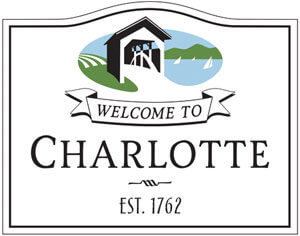Planning Commission continues discussion of East Charlotte Village commercial boundaries

Act 143 and land use regulations also considered
The October 3 Planning Commission meeting continued discussions on the East Charlotte Village (ECV) district boundary and how Act 143 could be applied to the Charlotte Land Use Regulations. With the minute taker and town planner both out sick, the commission was left to their own visual presentations on the topics.
Vice Chair Charlie Pughe walked commission members through his proposed ECV commercial district boundaries as well as through a draft analysis of potential buildouts (i.e., houses) based on current zoning regulations. Pughe explained he drew the proposed boundary lines based on parcel lines and land contours, when applicable. Planning Commission member Marty Illick agreed, “Planning-wise, it’s better to follow a parcel line. It does make the map easier—you don’t have to survey.” Chair Peter Joslin and Pughe both spoke of making progress on the map, with Joslin noting, “We can come to some level of conclusion, so it would be easier to get feedback on.”
Pughe’s spreadsheet garnered a myriad of questions from the commission, as well as request from Illick to add additional scenarios of density based on senior and affordable housing. Pughe said, based on his analysis, “It’s very complicated to figure out how many houses you can build.”
Selectboard Member Carrie Spear, the only member of the public to attend the meeting, said, “I think of two groups: young families and seniors. Especially seniors that want to downsize but not leave their town. I think that would be important in the village and would like to encourage that.”
When Planning Commission Chairman Peter Joslin raised the idea of investigating potential septic and water in the village, Spear responded that the costs of infrastructure should be borne by the developer, saying, “I don’t see it as town water and wastewater—that has nothing to do with the town.” Planning Commission member Gerald Bouchard concurred. “To me the people using it should be paying for it.”
As the topic wrapped up, Pughe agreed to revise the potential buildouts analysis and the proposed boundary map for the next meeting.
Act 143
The Planning Commission then, once again, again took up the topic of Act 143, which relates to the land-use regulation of accessory on-farm businesses. Members expressed differing opinions and interpretations of the law. Joslin questioned the language of the law that states that municipalities may not prohibit accessory on-farm businesses if more than 50 percent of the business’s annual sales are from products “principally produced on the farm at which the business is located.”
“What does that 51 percent mean?” asked Joslin. “Is it a state requirement or not?” Planning Commission member James Faulkner said that at the commission’s previous meeting, “State Representative Mike Yantachka said the 51 percent was not a requirement, it was a criterion. … In my mind, it completely threw it off.”
Illick, citing the vagueness of the law, asked, “What do we do until the language is more explicit?” She said she would like the process to include updating the Town Plan first and then updating land use regulations. Planning Commission member Shawn Coyle suggested the commission “do nothing until they shore up the language,” saying, “It’s going to get changed.”
Pughe expressed concern that the current interpretation of the Act “seems to be circling around opening a business on a farm that is a retail business distinct from traditional farming.” He discussed the idea of using criteria similar to the current land use regulations for home occupations, noting they could be used in a similar approach for accessory agricultural businesses.
Commission members discussed the idea of a registry of all Charlotte farms with members again offering differing opinions on what kind of data should be collected and the overall goal of the exercise. Faulkner noted, “We don’t have the scope of (the number of farms) we are trying to make regulations for.”
The commission agreed to continue the discussion. Joslin offered to contact Representative Yantachka and the VT State Department of Agriculture for more information.

